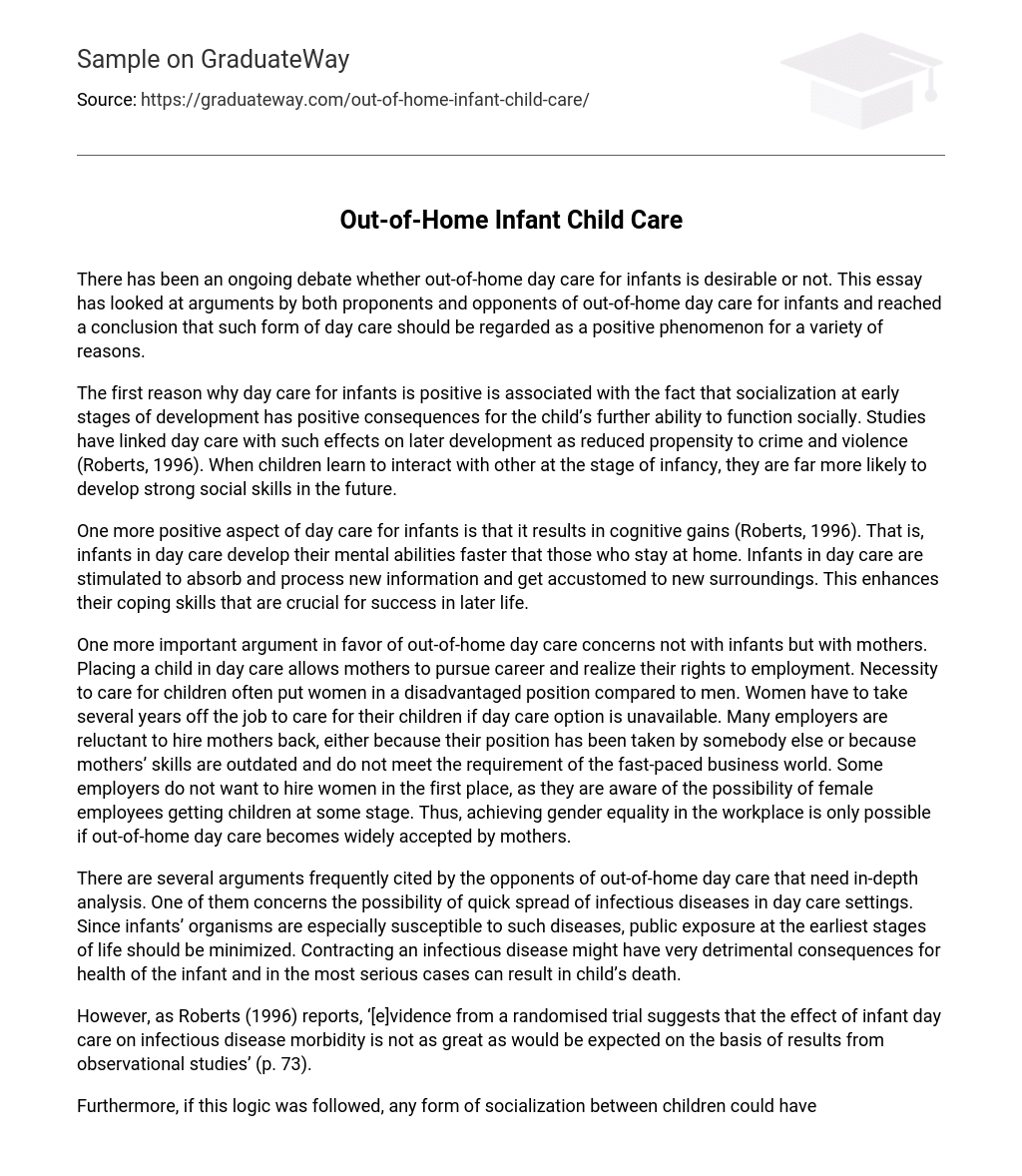There has been an ongoing debate whether out-of-home day care for infants is desirable or not. This essay has looked at arguments by both proponents and opponents of out-of-home day care for infants and reached a conclusion that such form of day care should be regarded as a positive phenomenon for a variety of reasons.
The first reason why day care for infants is positive is associated with the fact that socialization at early stages of development has positive consequences for the child’s further ability to function socially. Studies have linked day care with such effects on later development as reduced propensity to crime and violence (Roberts, 1996). When children learn to interact with other at the stage of infancy, they are far more likely to develop strong social skills in the future.
One more positive aspect of day care for infants is that it results in cognitive gains (Roberts, 1996). That is, infants in day care develop their mental abilities faster that those who stay at home. Infants in day care are stimulated to absorb and process new information and get accustomed to new surroundings. This enhances their coping skills that are crucial for success in later life.
One more important argument in favor of out-of-home day care concerns not with infants but with mothers. Placing a child in day care allows mothers to pursue career and realize their rights to employment. Necessity to care for children often put women in a disadvantaged position compared to men. Women have to take several years off the job to care for their children if day care option is unavailable. Many employers are reluctant to hire mothers back, either because their position has been taken by somebody else or because mothers’ skills are outdated and do not meet the requirement of the fast-paced business world. Some employers do not want to hire women in the first place, as they are aware of the possibility of female employees getting children at some stage. Thus, achieving gender equality in the workplace is only possible if out-of-home day care becomes widely accepted by mothers.
There are several arguments frequently cited by the opponents of out-of-home day care that need in-depth analysis. One of them concerns the possibility of quick spread of infectious diseases in day care settings. Since infants’ organisms are especially susceptible to such diseases, public exposure at the earliest stages of life should be minimized. Contracting an infectious disease might have very detrimental consequences for health of the infant and in the most serious cases can result in child’s death.
However, as Roberts (1996) reports, ‘[e]vidence from a randomised trial suggests that the effect of infant day care on infectious disease morbidity is not as great as would be expected on the basis of results from observational studies’ (p. 73).
Furthermore, if this logic was followed, any form of socialization between children could have been labeled as dangerous and undesirable. There are chances of contracting infectious diseases at all public institutions such as schools or public transport. Instead of depriving children from benefits of interaction, stricter diseases control and prevention should be in place.
One more argument that is often used by the opponents of out-of-home day care is that the level of stress infants have to cope with when being placed in unfamiliar surroundings might be detrimental for their physical and mental health. Separation anxiety might become a serious problem for some children leading to phobias or other psychic deviations in later life. It has been argued that ‘[i]nfants’ emotional development may be disrupted when the attachment process is undermined by the repeated extended separation involved in placing an infant in full-time daycare’ (Pagewise, 2002, para. 1).
However, it has been already noted that day care results in improved cognitive and socialization skills. While some problems may arise, gains in social skills eventually outweigh possible problems encountered by infants:
‘Although children enrolled in infant day care during their first year have sometimes been characterized as aggressive with their peers and more noncompliant with adults, they have been characterized as more sociable with their peers as well’ (Volling & Feagans, 1995, p. 177).
One more fear associated with out-of-home day care is that infants might connect less to their parents. However, no persuasive evidence for that has been found to date.
Therefore, it is possible to conclude that out-of-home day care for infants is a positive phenomenon. It contributes to child development as well as female employability. In the future, out-of-home day care should become a widely accepted phenomenon in our society.
References
Pagewise. (2002). ‘Day care information: effects on infants emotional development.’ Retrieved October 27, 2008, from http://www.essortment.com/all/daycareinform_rwyy.htm
Roberts, I. (1996). Out-of-home day care and health. Archives of Disease in Childhood, 74(1): 73-76.
Volling, B.L., & Feagans, L.V. (1995). Infant Day Care and Children’s Social Competence. Infant Behavior and Development, 18(2): 177-188.





